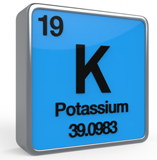Potassium - Uses, Benefits, Sources and Dosage

We should not underestimate the importance of potassium in our diet plan. It is an important component which is essential for a healthy body. Potassium is an essential body mineral which is important for both cellular and electrical function. Potassium plays an important role in synthesis of proteins and muscle tissues. It also works inside our cells to maintain the pH. Blood serum contains approximately 4-5 mg of total potassium where as red blood cells contain the 420 mg. It is considered as the major blood mineral called as the electrolyte which carries the electrical charge.
Benefits of Potassium
- It acts as vasodilator and important to maintain the good functioning of brain.
- It is good for the regular contraction and relaxation of muscles.
- It provides strength to muscles.
- It helps to maintain the healthy blood pressure level in body.
- It helps in proper growth of muscle tissue thus helps in muscle strengthening.
- It is also important for digestion.
- It also helps in the metabolic processing of various other nutrients like carbohydrates and fats.
- It is also integral in the protein synthesis.
- It is good to resolve the stress and anxiety. It helps in regulation of hormones.
- It supports the good functioning of heart and kidneys. It assists the kidney for the removal of waste by excretion.
- It acts as electrolyte and helps in the fluid balance in human body. Fluid balance is responsible for better functioning of our organ system.
Sources of Potassium
- Leafy green vegetables like broccoli, spinach, parsley, lettuce, peas, lima beans, tomatoes and potatoes have significant levels of potassium.
- Fruits which contain potassium are bananas, apples, avocados, raisins and apricots. Oranges and other citrus fruits are also rich source of potassium.
- Wheat germ, whole grains, seeds and nuts are also the potassium rich foods.
- Meat and fish such as the salmon, flounder, sardines and cod are also rich in potassium.
- Herbs like catnip, red clover, sage, catnip, hops, horsetail, nettle, skullcap and plantain also contain potassium.
Deficiency of Potassium
Chronic potassium deficiency is responsible for fatigue, muscles weakness, slow reflexes, insomnia, irregular heartbeat, bone fragility and loss of gastrointestinal tone. Deficiency of potassium also leads to various other health complications like congestive heart failure, fatigue, cardiac arrhythmia, fatigue, and depression and behavior changes. Vomiting, diarrhea, and gastrointestinal complications are responsible to reduce potassium levels in body.
Side Effects of High Amounts of Potassium in Body
There is a condition named as hyperkalemia in which there are elevated levels of potassium in blood stream which may lead to heart attack and paralysis. High amount of potassium may lead to kidney failure.
Daily Intake Recommendation of Potassium
Infants
- 0-6 months requires 400 mg
- 7-12 months requires 700 mg
Children
- 1-3 year requires 3000mg
- 4-8 year requires 3800 mg
- 9-13 years requires 4500 mg
In adults
- Above the age of 14 potassium requirement both in the case of males and females is 4700mg.
- In case of pregnant women potassium required is 4700 mg.

